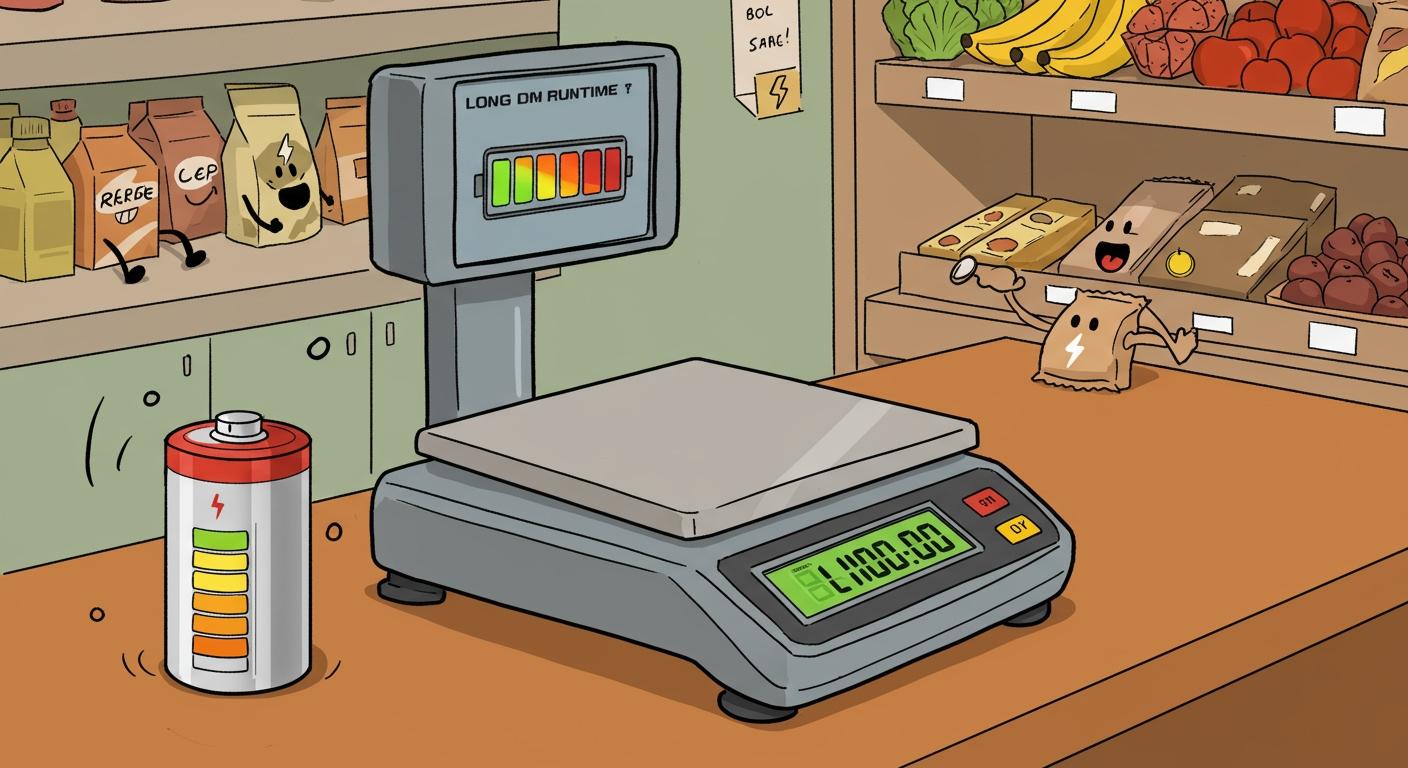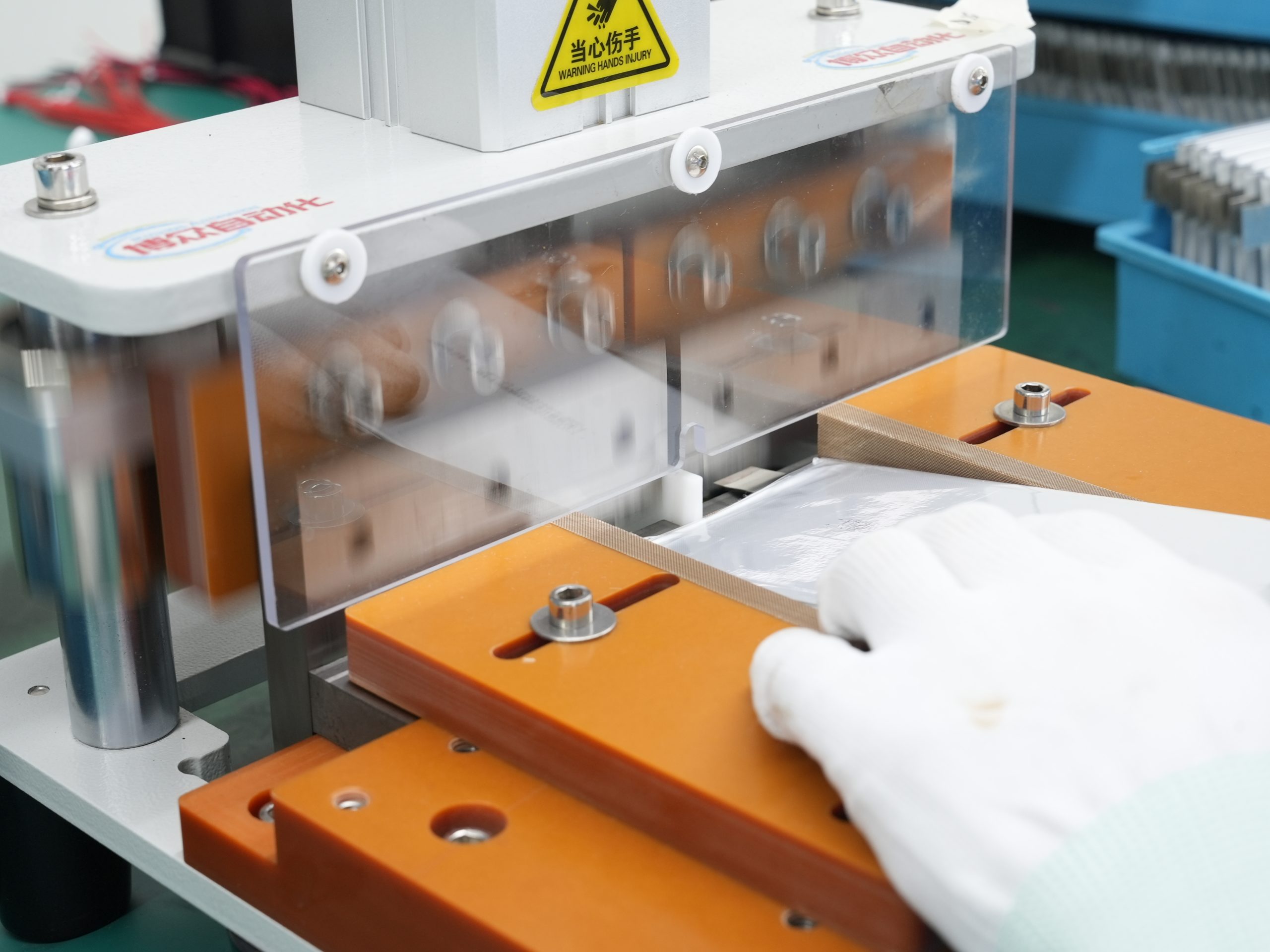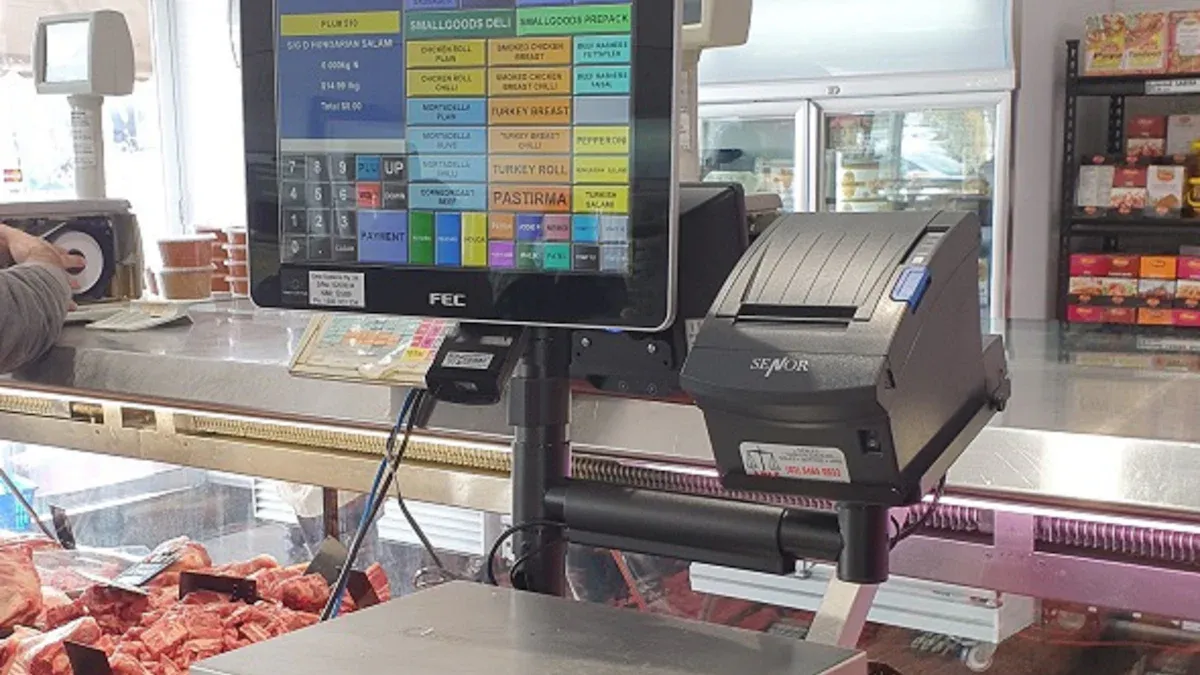
Lithium batteries extend the runtime of retail electronic scales. You get higher energy density and longer lifespan with lithium-ion cells. Lithium-ion technology charges quickly and loses little power over time. Lithium-ion packs do not suffer from memory effect. Using lithium-ion batteries, you maximize uptime in retail environments.
Key Takeaways
Lithium-ion batteries provide higher energy density, allowing retail electronic scales to operate longer between charges.
Fast charging capabilities of lithium-ion batteries reduce downtime, ensuring scales are ready for use quickly in busy retail environments.
Low self-discharge rates mean lithium-ion batteries retain their charge longer, keeping scales operational even after periods of inactivity.
Part 1: Lithium Batteries Advantages

Lithium batteries have transformed the way you power retail electronic scales. Their advanced chemistry and design offer significant improvements in energy storage, charging speed, reliability, and long-term performance. Let’s explore the core technical advantages that make lithium-ion batteries the preferred choice for B2B retail operations.
1.1 Energy Density
You benefit from higher energy density when you use lithium-ion batteries in your retail electronic scales. Energy density measures how much energy storage a battery provides for its weight or volume. This directly affects the duration your devices can operate between charges.
Here is a comparison of energy density across common battery types used in retail electronic scales:
Battery Type | Energy Density (Wh/kg) | Energy Density (Wh/liter) |
|---|---|---|
Nickel-cadmium | 45-80 | 15-80 |
Nickel-metal hydride | 60-120 | 80-200 |
Lithium-ion | 50-260 | 200-400 |
Lithium-ion batteries, including chemistries such as NMC (Nickel Manganese Cobalt Oxide), LCO (Lithium Cobalt Oxide), LMO (Lithium Manganese Oxide), and LiFePO4 (Lithium Iron Phosphate), deliver superior energy storage. This means you can design lighter, more compact retail scales with longer duration between charges. In sectors like medical, robotics, and consumer electronics, high energy density also enables portable devices with extended runtime.
1.2 Fast Charging
Lithium-ion batteries support fast charging, which helps you reduce downtime in busy retail environments. Quick energy replenishment is essential when you need your electronic scales to operate continuously.
Fast charging at higher rates (1.5C and 2C) can reduce battery lifespan by approximately 50% and 70%, respectively.
Increased internal resistance and heat generation during fast charging can decrease battery efficiency and longevity.
The efficiency of lithium-ion batteries drops significantly at high charge rates, which can affect reliability in retail applications.
Fast charging technology is essential for modern retail devices that require quick turnaround.
Effective thermal management during fast charging helps maintain battery life and performance.
You should balance charging speed with battery health. Using a battery management system (BMS) can help optimize charging cycles and protect your lithium battery packs. Learn more about BMS here.
1.3 Low Self-Discharge
Lithium-ion batteries have a low self-discharge rate, which means they retain their charge for longer periods when not in use. This feature ensures your retail electronic scales remain ready for operation, even after extended inactivity.
Battery Type | Self-Discharge Rate (per month) |
|---|---|
Lead-Acid | ~5% |
Lithium-Ion | ~2% |
Nickel-Based | Higher than Lithium |
Low self-discharge supports longer shelf life and reliability. You do not need to replace or recharge batteries as often, which reduces maintenance and operational interruptions. The table below highlights how this characteristic benefits retail electronic scales:
Characteristic | Impact on Retail Electronic Scales |
|---|---|
Low Self-Discharge Rate | Retains charge over long periods, reducing battery depletion |
Extended Inactivity | Ensures scales are ready for use without frequent replacements |
Performance Maintenance | Helps maintain accuracy and reliability of the scales |
This advantage also applies to other sectors, such as security systems and industrial infrastructure, where devices may remain idle for long periods but must function reliably when needed.
1.4 No Memory Effect
You never have to worry about the memory effect with lithium-ion batteries. Unlike nickel-cadmium batteries, which lose usable capacity after repeated partial discharges, lithium-ion batteries maintain their full energy storage capability.
Research shows that nickel-cadmium batteries experience a memory effect, but lithium-ion batteries do not. Only certain lithium chemistries, such as LiFePO4, may show a minor memory effect under specific conditions, but this does not impact most retail applications.
The absence of memory effect means you can recharge your lithium battery packs at any time without reducing their duration or capacity. This ensures accurate state of charge (SoC) estimation and prevents premature energy cut-off. For retail electronic scales, this reliability supports consistent performance and longer operational life.
Tip: Always use certified lithium battery packs with proper safety certifications (such as UL, UN38.3, and IEC 62619) to ensure safe and reliable operation in your retail environment.
Part 2: Practical Benefits for Retailers

2.1 Reduced Downtime
You want your retail electronic scales to work as long as possible without interruptions. Lithium-ion technology delivers longer runtime per charge, so your staff spends less time swapping batteries. With lithium-ion, you also benefit from faster charging, which means your equipment returns to service quickly. You experience fewer operational interruptions because lithium-ion batteries require less maintenance. These improvements lead to higher productivity and more reliable retail operations.
Longer runtime per charge minimizes downtime.
Faster charging allows for quicker turnaround.
Less maintenance reduces operational interruptions.
Equipment operates longer without breaks for cooling, boosting productivity.
Employees focus on core tasks instead of battery management.
2.2 Maintenance Savings
Lithium-ion batteries help you save on maintenance costs. You do not need to worry about watering or cleaning, which is common with lead-acid batteries. The table below shows how maintenance requirements compare:
Battery Type | Maintenance Requirements |
|---|---|
Lithium | Zero maintenance—no watering, no corrosion |
Lead-Acid | Regular watering, cleaning, battery swaps required |
With lithium-ion, you avoid corrosion and frequent battery swaps. This means you spend less time and money on upkeep, and your scales stay in service longer.
2.3 Maximizing Lithium-Ion Performance
You can extend the life and reliability of your lithium-ion battery packs by following best practices. These steps help you get the most from your investment and support long-duration energy storage:
Charge your batteries when you receive them.
Purchase spares and keep them charged for long-duration storage.
Learn to read battery date codes to track storage duration.
Watch for signs of battery depletion to maintain battery performance.
Plan ahead for supply chain delays to ensure long-duration energy storage.
Proper charging and storage also matter. Store batteries at 30% to 50% state of charge for optimal battery performance and long-duration storage. Regularly inspect batteries in storage to ensure safety and reliability. Use certified chargers and keep batteries away from combustible materials.
Temperature management is key for lithium-ion battery packs. Use passive cooling like heat sinks or phase change materials (PCM) to dissipate heat. For high-demand applications, consider active cooling methods such as air or liquid cooling. These strategies help maintain battery performance and extend storage duration in retail, medical, robotics, and industrial settings.
You gain superior battery longevity and performance with lithium-ion in retail electronic scales. Lithium-ion delivers higher energy density, fast charging, and low self-discharge, which maximize battery longevity and operational uptime.
Lithium batteries have a longer lifespan than lead acid batteries, which reduces the need for frequent replacements. This leads to less storage space required for batteries in warehouses, allowing for more efficient use of space for product storage. Additionally, lithium batteries operate with 2.5 times the efficiency of lead acid batteries in cold climates, further enhancing their cost-saving potential.
Follow these lithium-ion best practices for battery longevity:
Recommended Best Practices | Benefits |
|---|---|
Charge between 20% and 80% | Extends battery longevity |
Use the correct charger | Prevents damage and supports battery longevity |
Keep battery at room temperature | Maintains lithium-ion stability |
Store at 60–70% charge in a cool, dry place | Reduces aging and supports battery longevity |
Avoid deep discharges | Preserves lithium-ion cycle life and battery longevity |
When you select lithium-ion battery packs, review these key considerations:
Consideration | Description |
|---|---|
Specifications | Match lithium-ion voltage and capacity to your scale’s needs. |
Safety Features | Choose lithium-ion packs with BMS and thermal stability. |
Cost vs Performance | Balance lithium-ion cost and battery longevity. |
Supplier Evaluation | Ensure lithium-ion suppliers meet safety standards. |
Energy Density | Higher lithium-ion energy density enables lighter scales. |
Cycle Life | Longer lithium-ion cycle life increases battery longevity. |
Thermal Management | Good lithium-ion heat management improves safety and battery longevity. |
You can apply these lithium-ion strategies in retail, medical, robotics, security, and industrial sectors. Choose lithium battery packs for reliable battery longevity and cost savings.
FAQ
How does lithium-ion technology improve battery life and capacity in retail electronic scales?
You get longer battery life and higher capacity with lithium-ion packs. Battery life increases because lithium-ion cells store more energy. Capacity supports extended runtime and reliable operation in retail, medical, and industrial sectors.
Battery life: Extended usage between charges.
Capacity: More energy for longer operation.
Storage: Efficient energy retention.
Application: Retail, medical, robotics, security, infrastructure, consumer electronics, industrial.
Feature | Battery Life | Capacity | Storage |
|---|---|---|---|
Lithium-ion | High | High | High |
Lead-acid | Low | Low | Low |
NiMH | Medium | Medium | Medium |
What factors affect the battery life and capacity of lithium battery packs in retail scales?
You influence battery life and capacity by managing charge cycles, temperature, and storage conditions. Proper storage and charging extend battery life and maintain capacity for retail, medical, and industrial applications.
Tip: Store lithium battery packs at optimal temperature and charge level to maximize battery life and capacity.
Charge cycles: Fewer deep discharges improve battery life and capacity.
Temperature: Room temperature storage preserves battery life and capacity.
Storage: Cool, dry storage extends battery life and capacity.
How can you maximize battery life, capacity, and storage for lithium battery packs in retail environments?
You maximize battery life, capacity, and storage by following best practices. Charge between 20% and 80%. Use certified chargers. Store packs at 60–70% charge in a cool, dry place.
Best Practice | Battery Life | Capacity | Storage |
|---|---|---|---|
Partial charging | Longer | Higher | Better |
Correct charger | Longer | Higher | Safer |
Temperature control | Longer | Higher | Safer |
Proper storage | Longer | Higher | Safer |
Note: Consistent maintenance and monitoring help you achieve optimal battery life, capacity, and storage for lithium battery packs in retail, medical, robotics, security, infrastructure, and industrial sectors.




